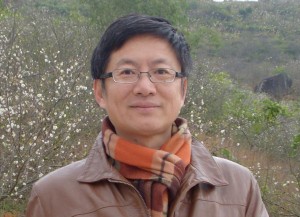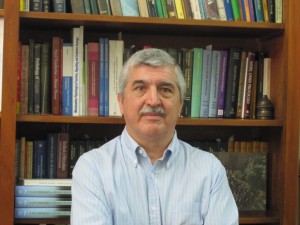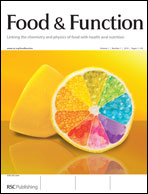Cesar Fraga talks to Kathleen Too about the health benefits of cocoa, why you should eat fruit and vegetables with lots of antioxidants and scientific food research in South America.
 |
Cesar Fraga is a professor at the University of Buenos Aires in Argentina and is associated with the department of nutrition at the University of California, Davis, US. His main areas of interests are in plant-derived polyphenolic compounds against degenerative disorders, including cardiovascular disease and certain cancers. He is also an associate editor for Food & Function, a new journal from RSC Publishing |
What motivated you to specialise in food and nutrition?
My first steps in research were made under the supervision of Alberto Boveris at the University of Buenos Aires, where later I got my doctoral degree. Alberto had just created his research group and we were working on the in vivo determination of excited species as an index of free radical damage and protection by antioxidants. My interests in antioxidants and their health effects grew from that day forward. With an increased interest in antioxidants as health promoters, my involvement in food and nutrition also grew. There is a need for more scientists to investigate the mechanisms behind the nutritional and functional aspects of food.
Could you explain what catechins, flavonoids and polyphenols are?
These are chemical compounds: polyphenol is the characteristic common to the three; flavonoids are a certain kind of polyphenol, and catechins certain kind of flavonoids. All are present in plants that we often eat so they are part of human diets. The chemical structures of these compounds support chemical reactions that explain the health benefits of eating fruit and vegetables. The identification of such chemical substances present in foods did not get much attention in the past. But today, it is becoming more relevant in terms of defining important biological functions.
You are most interested in the benefits and impact of certain foods in the body, what is the hottest area of research at the moment?
I consider that heart and intestinal diseases are conditions that can easily be affected by the type of food eaten. Clearly both conditions are related to other important increasing pathologies such as obesity and diabetes, among others. Knowing the mechanisms of these diseases and the participation of food components in them could allow us to design better diets and if not enough, to supplement the diet or provide a therapeutic agent. Our main target is to study the effects of healthy foods and their components.
You worked on the effects of chocolate consumption. Could you comment on its nutritional value?
In the past, it has been demonstrated that eating dark chocolate, with a very high percentage of cocoa, can improve our vascular function which is directly involved in preventing heart disease, and hypertension and associated diseases. There are also evidences that relate cocoa consumption with a better intestinal function, inflammation, including brain health. However, I am very cautious in saying that the health benefits of cocoa justify a ‘therapeutic’ and non controlled increase in chocolate in our diets. But, I can safely say that we can incorporate a moderate and appropriate consumption of chocolate as part of a healthy diet.
Could you comment on the scientific research output in South American countries?
Nutrition research in South America is growing in quantity but more important in quality. We have the Pampas, the Amazonas, and the Andean ecosystems that consist of many indigenous plants. The latter play a big role in folkloric medicine. I am convinced that South America can be an attractive hub for research in food components and their health promoting functions. I would like to think that I can contribute towards that vision.
As one of the associate editors who will be handling papers for the new RSC journal Food & Function, what do you find most exciting about this journal?
I like the journal’s vision of being at the interface between basic and applied research in nutrition. Food & Function will be a great venue for research on how the physical and chemical properties of food can affect the vital biochemical and physiological actions inside the body. The journal will be a fantastic vehicle to make basic research from the laboratory more readily accessible to everyone who is interested in reading about the health benefits of food.
What does the term Food & Function mean to you?
Foods have various functions. For example, most fruits and vegetables contain nutrients and constituents that are not essential or at least we do not know if they are, but generally, they promote better health. It is believed that they co-act in the prevention, and perhaps, cure of certain diseases.
Which scientists do you most admire and why?
I can safely say that I have had three major teachers in my career and I admire certain aspects of the scientific endeavour of all three of them. I admire the discussion and work aptitude of Alberto Boveris, my PhD supervisor; the scientific vision of Al Tappel; and Bruce Ames’s capability to generate novel ideas and crystallise them. Additionally, during the last few years I have met UC Berkeley’s legendary scientist, Lester Packer, from whom I have learnt that apart from producing good science, it is also important to generate the niche in which science is created and grows. And last but not least I definitely admire the fire and dedication to science of Patricia Oteiza, my wife, who is also a nutrition scientist.
Also of interest
Food & Function
A new peer-reviewed journal linking the chemistry and physics of food with health and nutrition
Instant insight: Understanding our food
Monika Pischetsrieder and Rainer Baeuerlein look at how the safety of GM food can be assured
Instant insight: Is your food safe to eat?
Gordon Shephard highlights the analytical methods used to ensure our food is free from the natural toxins produced by fungi
Comments Off on Interview: Chemistry for a healthy diet















